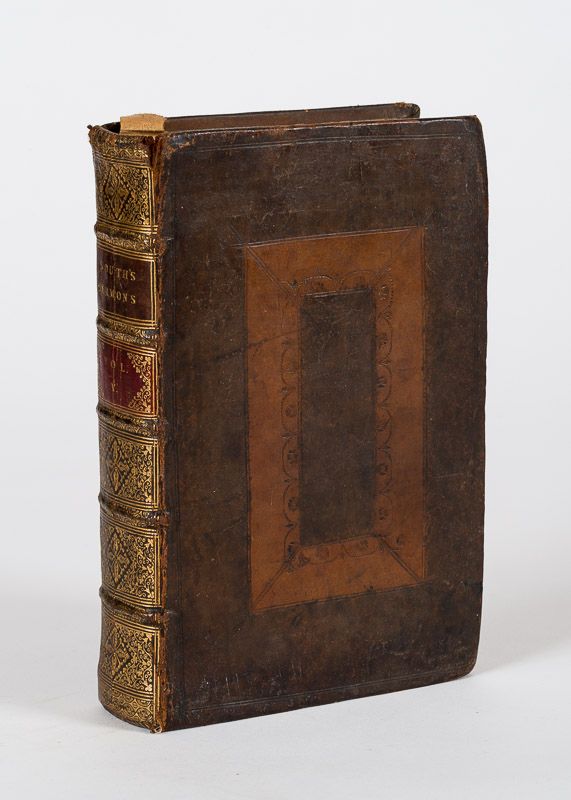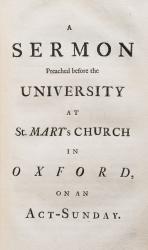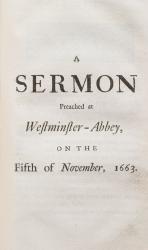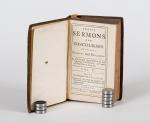South, Twelve sermons preached upon several occasions.
Twelve sermons preached upon several occasions. By Robert South, D.D. late Prebendary of Westminster and Canon of Christ-Church, Oxon &c. – Printed from his original manuscripts, prepared fro the Press by himself and published by his special direction and appointment / [Including for example: “The Virtuous Education of Youth, the surest way, if not sole way to an Happy and Honourable Old Age in a Discourse upon Proverbs XXII, Vers 6, with the author’s advertisement to the Reader – Train up a child in the way he should go and when he is old, he will not depart from it” / “The False Methods of Governing and Establishing the Church of England exploded, &c. in a Discourse upon Galatians II, 5” / “A Sermon preached before the University at St. Mary’s Church in Oxford on an Act-Sunday” / “A Sermon preached at Westminster – Abbey on the Fifth of November , 1663” etc.]
Volume V. London, J. Bowyer, 1717. 12 cm x 19 cm. (12), 564 pages. Original hardcover / Full leather with gilt lettering and ornament on spine. Very good condition with only very minor signs of external wear. Excellent paper quality. From the reference library of Hans Christian Andersen – Translator Erik Haugaard. With his Exlibris to the pastedown.
Robert South (4 September 1634 – 8 July 1716) was an English churchman who was known for his combative preaching and his Latin poetry. He was the son of Robert South, a London merchant, and Elizabeth Berry. He was born at Hackney, Middlesex, and was educated at Westminster School under Richard Busby, and at Christ Church, Oxford, matriculating on 11 December 1651.
Among his college exercises was a panegyric on Oliver Cromwell in Latin verse on the conclusion of peace at the end of the First Anglo-Dutch War (5 April 1654). He commenced B.A. on 24 February 1654–5. On account of his using the Book of Common Prayer John Owen, then Dean of Christ Church and vice-chancellor, unsuccessfully opposed his proceeding M.A. on 12 June 1657. South travelled on the continent, and in 1658 privately received episcopal ordination, perhaps from Thomas Sydserf. He was incorporated M.A. at Cambridge in 1659. His assize sermon at St. Mary’s on 24 July 1659 was an attack on the Independents, with a sample of the humour for which South became famous. In his university sermon on 29 July 1660 he included the Presbyterians in his invective, referring to Henry Wilkinson as ‘Holderforth.’
He was chosen public orator to the university on 10 August 1660, an office which he held till 1677. Edward Hyde, 1st Earl of Clarendon made him his chaplain, in consequence of his oration on his installation as chancellor (15 November). On 30 March 1663 he was installed prebendary of Westminster. On 1 Oct. 1663 he was created B.D. and D.D. on letters from Clarendon. The creation was opposed in convocation by those who reckoned South a time-server. On a scrutiny, Nathaniel Crew, the senior proctor, declared the majority to be for South, who was presented by John Wallis. He was incorporated D.D. at Cambridge in 1664. Clarendon gave him in 1667 the sinecure rectory of Llanrhaiadr-y-Mochnant, Denbighshire, and on Clarendon’s fall, at the end of that year, he became chaplain to James, Duke of York.
South’s ridicule of the Royal Society, in an oration at the dedication of the Sheldonian Theatre, July 1669, called forth a remonstrance from Wallis, addressed to Robert Boyle. South was installed canon of Christ Church on 29 Dec. 1670.
A zealous advocate of the doctrine of passive obedience, he strongly opposed the Toleration Act, declaiming in unmeasured terms against the various Nonconformist sects. In 1676 he was appointed chaplain to Lawrence Hyde, Earl of Rochester, ambassador-extraordinary to the king of Poland, and he sent an account of his visit to Edward Pococke in a letter, dated Dantzic, 16 December 1677, which was printed along with South’s Posthumous Works in 1717. In 1678 he was presented to the rectory of Islip, Oxfordshire.
He lived at Caversham, near Reading, Berkshire, where he had an estate. South was chaplain in ordinary to Charles II, but had no other preferment from him than the Westminster prebend.
In James II’s reign Rochester, then lord-lieutenant of Ireland, is said to have offered South an Irish archbishopric (Cashel was vacant, 1685–91). Rochester nominated South (November 1686) as one of two Anglican divines to discuss points of doctrine with two of the church of Rome; but James objected to South, and Simon Patrick was substituted.
At the Glorious Revolution South hesitated to transfer his allegiance, being, according to White Kennett, under the influence of William Sherlock, D.D. He at length took the oath, adopting the parliamentary fiction that James’s flight constituted an abdication. He is said to have declined a bishopric vacated by a nonjuror. He opposed the scheme for a comprehension of dissenters, but was not a member either of the royal commission (13 September 1689) on the subject, or of the convocation of that year.
In 1693 South intervened anonymously in the Socinian controversy, with strong animus against Sherlock, his Animadversions on Sherlock’s Animadversions on Dr Sherlock’s Book, entitled a Vindication of the Holy and Ever Blessed Trinity (1690) being ‘humbly offered to his admirers, and to himself the chief of them.’ He made galling references to Sherlock’s career, ‘tainted with a conventicle’ at the outset; vehemently assailed his earlier writings as heterodox on the doctrine of atonement, and maintained his ‘new notion’ of the Trinity to be tritheistic; an opinion reiterated in his ’‘Tritheism Charged upon Dr Sherlock’s New Notion of the Trinity, and the Charge Made Good (1695). The anonymity of these attacks was transparent. It is not certain that South was the translator of A Short History of Valentinus Gentilis the Tritheist (1696) from the Latin of Benedict Aretius; the dedication to the hierarchy is in his manner, and there is a reference to Gentilis in Tritheism Charged. p. 47. South’s position is mainly that of Wallis; but he chiefly devotes learning and to demolishing Sherlock. Public judgment on the controversy was expressed in William Pittis’s ballad, ‘The Battle Royal’. The controversy was carried into the pulpit, and made for such sharp feelings that the king interposed to stop it.
He published a large number of sermons, and they appeared in a collected form in 1692 in six volumes, reaching a second edition in his lifetime in 1715. There have been several later issues; one in two volumes, with a memoir (Henry George Bohn, 1845).
His Opera posthuma Latina, including his will, his Latin poems (among them the at South’s time well-known witty poem Musica incantans about the power of music), and his orations while public orator, with memoirs of his life, appeared in 1717. An edition of his works in 7 vols. was published at Oxford in 1823, another in 5 vols in 1842. (Wikipedia)
- Keywords: Catalogue No.7 – Religion · Erik Haugaard Collection · Religion – Rare
- Language: English
- Inventory Number: 44810AB
EUR 160,--
© 2025 Inanna Rare Books Ltd. | Powered by HESCOM-Software














